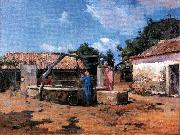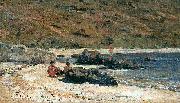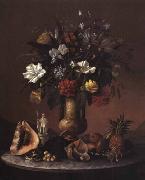Antonio Carvalho de Silva Porto El petróleo que Pinta la ReproducciónAll Antonio Carvalho de Silva Porto Oil Paintings(Porto, 11 November 1850 - Porto, 11 June 1893) was a Portuguese naturalist painter. Born in Porto, he studied there under João Antenio Correia and T. Furtado, then continued his studies in Paris and Rome. While in Paris he exhibited his work in the Salon and in the World´s Fair of 1878. In Paris, he studied with his friend João Marques de Oliveira, where they were pupils of Adolphe Yvon and Alexandre Cabanel. They became followers of the naturalist Barbizon School, and brought the new school of painting to Portugal, when they returned in 1879. Silva Porto become one of the most acclaimed naturalist painters of his generation, showing the heritage of Jean-Baptiste Camille Corot and Charles-François Daubigny. Secondary effects from impressionism can sometimes be found in his paintings. |
|||

|
|||
|
|
|||
|
||||||||
| Antonio Carvalho de Silva Porto (Porto, 11 November 1850 - Porto, 11 June 1893) was a Portuguese naturalist painter. Born in Porto, he studied there under João Antenio Correia and T. Furtado, then continued his studies in Paris and Rome. While in Paris he exhibited his work in the Salon and in the World´s Fair of 1878. In Paris, he studied with his friend João Marques de Oliveira, where they were pupils of Adolphe Yvon and Alexandre Cabanel. They became followers of the naturalist Barbizon School, and brought the new school of painting to Portugal, when they returned in 1879. Silva Porto become one of the most acclaimed naturalist painters of his generation, showing the heritage of Jean-Baptiste Camille Corot and Charles-François Daubigny. Secondary effects from impressionism can sometimes be found in his paintings. |
||||||||
|
|
||||||||
| Pintura identificación:: 86207 Na cisterna Medium Oil on paper Dimensions 42.5 x 56.5 cm (16.7 x 22.2 in) cjr |
||||||||
|
|
||||||||
| Pintura identificación:: 92144 Recanto de praia Unknown date Medium oil on panel Dimensions 31.5 X 54.5 cm (12.4 X 21.5 in) cyf |
||||||||
|
|
||||||||
| Pintura identificación:: 96568 Still Life with small statue of Pedro I of Brazil 1841(1841) Medium oil on canvas Dimensions 100 X 85 cm cyf |
||||||||
|
|
||||||||
|
| ARTISTA PREVIO PROXIMO ARTISTA | |||||||
|
|
||||||||
|
Antonio Carvalho de Silva Porto (Porto, 11 November 1850 - Porto, 11 June 1893) was a Portuguese naturalist painter. Born in Porto, he studied there under João Antenio Correia and T. Furtado, then continued his studies in Paris and Rome. While in Paris he exhibited his work in the Salon and in the World´s Fair of 1878. In Paris, he studied with his friend João Marques de Oliveira, where they were pupils of Adolphe Yvon and Alexandre Cabanel. They became followers of the naturalist Barbizon School, and brought the new school of painting to Portugal, when they returned in 1879. Silva Porto become one of the most acclaimed naturalist painters of his generation, showing the heritage of Jean-Baptiste Camille Corot and Charles-François Daubigny. Secondary effects from impressionism can sometimes be found in his paintings. |
||||||||
|
|
||||||||
|
CONTACTE EEUU |








